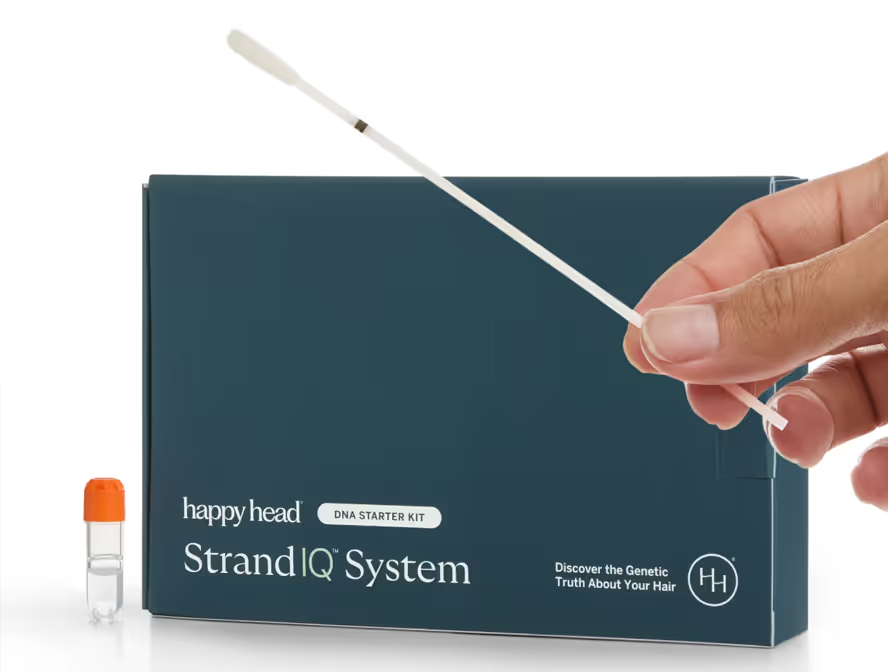Are you suffering from itchy, tender, or burning scalp? You’re not alone. Scalp irritability is a common but frustrating condition driven by inflammation—and for some, genetics can make it even worse. At the root of this sensitivity is your immune system. When cells on the scalp overreact to allergens or environmental toxins, they release inflammatory cytokines, triggering discomfort and even damaging hair follicles over time.
While inflammation can be a short-term protective response, chronic inflammation—caused by things like UV exposure, pollution, stress, or buildup from hair products—can disrupt your scalp’s barrier and impair healthy hair growth. Genetic variants in cytokine-related genes may further increase susceptibility, making a personalized care plan essential.
What Triggers Scalp Irritability?
Scalp irritation is your skin’s way of responding to internal and external stressors. A few common triggers include:
- Environmental toxins: Factors such as air pollution, cigarette smoke, and harsh weather all strip your scalp’s barrier and spark irritation.
- Hair product buildup: Over time, styling products and conditioners can build up on your scalp, trapping dirt and clogging hair follicles, worsening inflammation.
- Stress and lifestyle: Lifestyle factors such as chronic stress, lack of sleep, and poor diet can all elevate inflammation at the cellular level.
- Genetics: Variants in cytokine genes may make your scalp more prone to overreacting to otherwise minor stimuli.
Understanding your risk—especially from a genetic standpoint—can help you find the right strategy to protect your scalp.
How Genetics Shapes Your Scalp’s Sensitivity
While environmental triggers like pollution or product buildup are common culprits, your genes may be working behind the scenes to make your scalp more reactive. Research has identified genetic variants that influence how your immune system responds to perceived threats on the skin—specifically in cytokine-regulating genes, which govern inflammation.
If you’ve inherited variants that amplify pro-inflammatory cytokines or suppress anti-inflammatory ones, your scalp may overreact to mild irritants, resulting in chronic inflammation. This can lead to increased itchiness, redness, flaking, and even hair follicle damage over time.
Understanding these inherited risks gives you the power to tailor your scalp care—choosing calming ingredients, adjusting your routine, and working with personalized products like those offered by Happy Head to support a healthier, more resilient scalp.
How to Calm an Irritated Scalp
Managing scalp irritability starts with reducing inflammation and protecting your skin’s natural barrier. Here’s how to approach scalp care based on your individual risk level:
Low Risk: Keep Inflammation at Bay
If your Happy Head StrandIQ™ analysis identifies you as being at low risk for irritated scalp, simple measures may be enough to keep your scalp’s health in check.
- Exercise often
You may wonder what exercise has to do with your scalp, but regular movement helps your body to regulate the immune system and lowers baseline inflammation levels. - Exfoliate occasionally
Removing dirt, oil, and dead skin through monthly scalp exfoliating treatments prevents buildup that could trigger irritation. - Stay hydrated
Adequate water intake keeps your skin—including your scalp—moisturized and less prone to inflammation.
Medium Risk: Prevent and Protect Proactively
If you’ve been identified as being at moderate risk for scalp irritability—or if you’ve noticed that your scalp feels tender, irritated, or itchy despite low-risk interventions—it may be time to elevate your scalp care routine.
- Commit to consistent exercise
Physical activity improves blood flow and helps modulate the body’s inflammatory response. - Weekly scalp exfoliation
To help rid your scalp of pesky buildup and irritants, consider increasing the frequency of exfoliating treatments to once a week. - Evaluate your products
If your scalp is reacting, assess your current shampoo, conditioner, or styling products and opt instead for products with gentle, non-irritating ingredients. - Eat for inflammation control
Focus on a diet rich in polyphenol-rich foods (e.g., nuts and berries) and antioxidants (e.g., leafy greens and fruits), as they have been shown to calm internal inflammation.
High Risk: A Targeted Plan for Sensitive Scalps
If your StrandIQ™ analysis identified you as being at a high risk for scalp irritation, more substantial interventions—in addition to lower-risk tactics such as diet, exercise, and hydration—may be necessary to help keep your scalp in peak health.
- Pre-shower oil treatments
Apply a nourishing oil—like coconut oil—to your scalp before washing. This helps reduce dryness and soothes irritation. Serums with botanical extracts of natural anti-inflammatory agents (e.g. from Chamomile, Parsley,Turmeric, Green Tea, Rosemary) may also provide relief. See the phytotherapy section of our treatment insights report on whether these are likely to work for you. - Consult a Happy Head dermatologist
If your scalp remains inflamed or irritated, seek guidance from one of Happy Head’s skin and hair health experts to build a personalized plan including anti-inflammatory treatments tailored to your individual needs.
Building a Calmer Scalp: Your Personalized Path Forward
Managing scalp irritability starts with knowing your body. For those with a genetic predisposition to inflammation, irritability can feel like an uphill battle—but it doesn’t have to be. With personalized scalp care, tailored nutrition, and a mindful lifestyle, you can ease inflammation and protect both your skin and hair health.
Whether you're low risk or high risk, reducing scalp stress can make a real difference in comfort, appearance, and long-term wellness. And for those looking for customized care, Happy Head offers science-backed solutions based on your genetic traits and hair goals—because your scalp deserves targeted support.
Resources
StrandIQ SNP Marker Count: 15
StrandIQ Genes for Trait:
ADAD1, IFNG, IFNG-AS1, IL10, IL13, IL17A, IL18, IL19, IL6, IL6-AS1, LTA, STEAP1B, TEX12, TH2LCRR, TNF
References:
Colagiovanni, A., et al. (2016). Role of TNF-α polymorphism in patients with nickel allergy: a marker of susceptibility to contact polysensitization. European Review for Medical and Pharmacological Sciences, 20(12), 2663–2666. PMID: 27383320.
de Jongh, C.M., et al. (2007). Polymorphisms in interleukin-1 gene influence stratum corneum IL-1α concentration in chronic irritant contact dermatitis. Contact Dermatitis, 58(5), 263–268. PMID: 18416755.
Götz, A., et al. (2003). Cytokine gene polymorphisms in allergic contact dermatitis. Contact Dermatitis, 48(2), 93–98. PMID: 12694213.
Khatri, R., et al. (2015). Genetic endowment of proinflammatory cytokine TNF-α (–308 G>A) polymorphism to airborne contact dermatitis in an Indian cohort. International Journal of Dermatology, 54(2), 179–184. PMID: 24673179.
Landeck, L., et al. (2012). Impact of tumour necrosis factor-α polymorphisms on irritant contact dermatitis. Contact Dermatitis, 66(4), 221–227. PMID: 22404198.
Wang, B.J., et al. (2007). Tumor necrosis factor-alpha promoter and GST-T1 genotype predict skin allergy to chromate in cement workers in Taiwan. Contact Dermatitis, 57(5), 309–315. PMID: 17937745.
This content, including StrandIQ™ DNA analysis reports and any Happy Head products and/or services referenced therein, is for informational and cosmetic purposes only. It is not intended to diagnose, treat, cure, or prevent any disease. This content does not constitute medical advice and should not be used to make healthcare decisions. References to prescription treatments are educational in nature. Always consult a licensed healthcare professional for any medical concerns or treatment decisions.










.avif)

